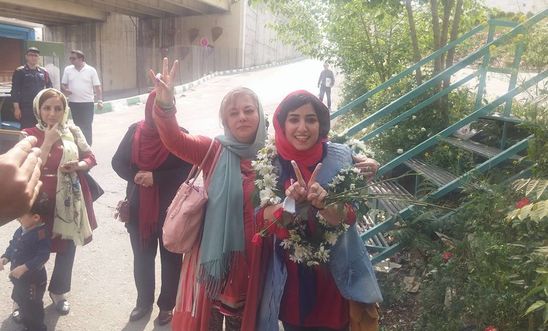
Press releases
Iran's long overdue release of jailed artist should be followed by freeing of other POCs

Atena Farghadani had published a cartoon satirising members of parliament
The release of Iranian artist and activist Atena Farghadani yesterday is a long-overdue step towards righting injustice against her and should be followed by the immediate and unconditional release of other peaceful artists and activists who remain behind bars in the country, Amnesty International said today.
Farghadani’s release came after an appeal court in Tehran dramatically reduced her original 12-years and nine months’ sentence to 18 months, most of which she had already served.
The appeal court upheld Farghadani’s 18 months’ prison term imposed for the charge of “spreading propaganda against the system”, but acquitted her on a charge of “gathering and colluding against national security”. It also commuted a nine-month imprisonment sentence for “insulting members of parliament through paintings”, “insulting the President” and “insulting prison officials” to a cash fine. However, the court also suspended a three-year prison sentence imposed for “insulting the Iranian Supreme Leader” for four years, meaning that the threat of further imprisonment hangs over Farghadani during this period. The Iranian authorities often resort to suspended sentences to create a climate of fear, coercing activists, journalists and others into silence or self-censorship.
Farghadani was sentenced on 1 June 2015 after a Revolutionary Court had convicted her - following a grossly unfair trial. All the charges stemmed from her peaceful activities, including meeting with families of political prisoners and criticising the authorities on social media and through her art work - art which included a cartoon that satirised members of Iran’s parliament for considering bills that restrict access to voluntary contraception and family planning services.
Last August, Farghadani said in a note smuggled out of prison that the authorities had subjected her to a forced “virginity test”, an abusive process that the authorities later confirmed had taken place. “Virginity testing” is highly discriminatory, compromises women’s dignity and rights to physical and mental integrity, and has been recognised as a violation of the prohibition of torture and other ill-treatment.
Meanwhile, in December, when she was out on bail, Farghadani released a video message describing how female prison guards at Evin Prison had beaten her, verbally abused her and forced her to strip naked for a body search.
Amnesty International’s Middle East and North Africa Deputy Director Magdalena Mughrabi said:
“While this is a time for celebration, it’s vital that the world doesn’t forget that Atena Farghadani should never have been imprisoned in the first place and that many others like her continue to languish in cells or have the threat of prison hanging over their head for peacefully exercising their rights“Atena Farghadani’s release represents a legal and moral victory for her and encourages the efforts of activists worldwide to campaign for the release of other prisoners of conscience in Iran, as well as for reforms to the unjust laws used to put them behind bars in the first place.“The Iranian authorities have 18 months of appalling injustice to make up for and they should start by investigating Atena Farghadani’s torture and other ill-treatment, including forced ‘virginity testing’. They should also ensure that her conviction and suspended sentence are quashed.”
Activists persecuted and imprisoned
Atena Farghadani’s release comes at a time when scores of others in Iran face harsh prison sentences imposed for their peaceful human rights activism. They include Atena Daemi, Omid Alishenas, Saeed Hosseinzadeh, and Asou Rostami, all of whom were arrested at around the same time and have been sentenced to harsh prison terms following grossly unfair trials on similar charges to Farghadani’s.
Magdalena Mughrabi added:
“The conviction and sentences of all these young activists must be immediately quashed and the Iranian authorities must stop using the threat of incarceration to stifle Iran’s young generation of activists.“Of course, a prisoner release is only a first step - the Iranian authorities must also reform the country’s repressive laws, which for too long have been used to clamp down on dissent. As long as these laws remain on the books, human rights defenders and activists will remain at risk of being jailed simply for expressing their opinions.”
Iran’s Islamic Penal Code includes vaguely-worded “crimes” such as “spreading propaganda against the system”, “creating unease in the public mind”, “insulting Islamic sanctities” and “membership of an illegal group”. These “offences” are frequently used to curb the peaceful exercise of the rights to freedom of expression, association, and peaceful assembly. Such laws and practices violate Iran’s international obligations, including those under Articles 19, 21 and 22 of the International Covenant on Civil and Political Rights, which guarantee the rights to freedom of expression, peaceful assembly and association.